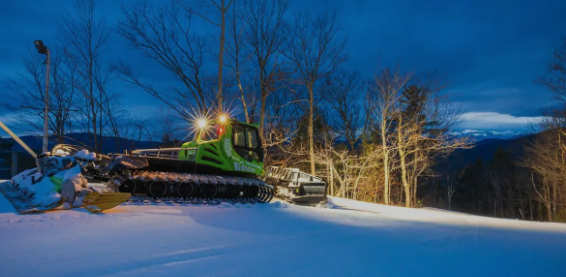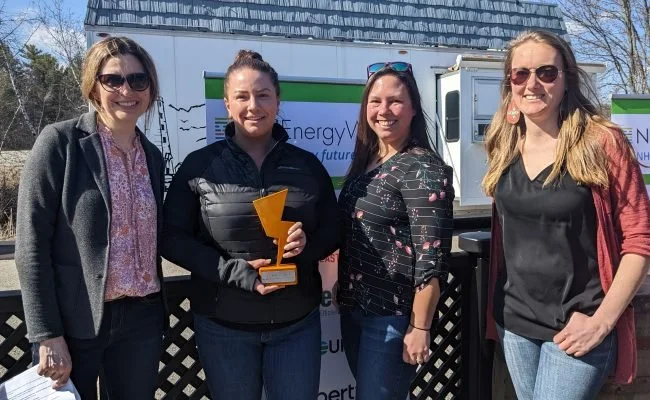
Ski NH: Defender of Winter, Advocate for Resorts
Representing 32 ski areas across the Granite State, Ski NH is keenly aware that nature and people are essential to the industry’s long-term prosperity. Therefore, the state-supported nonprofit is addressing many of the challenges resorts face, from a changing climate to employee relations.
“Climate and housing are huge issues for the industry,” says Ski NH’s president, Jessyca Keeler.
Indeed, climate change is a direct threat because it is reducing both snowfall amounts and snowmaking opportunities for ski areas. Any loss of days impacts profit margins with a four- to five-month season. By 2100, the natural snow cover season in the state could shorten to between one and two months, according to the 2021 New Hampshire Climate Assessment.
However, Ski NH and many of its members are taking steps to reduce their contribution to warmer winters. Cranmore, Attitash, and Wildcat, for example, are demonstrating that sustainability can be deployed throughout their operations and play an important role in meeting financial goals and customer and community expectations.
A Closer Look at Grooming and Community Relations: Cranmore, Attitash, and Wildcat
It's no secret that ski resorts are, well, energy hogs. It takes a lot of power to get customers up the mountain. And factoring in the amount of water that needs to be hauled up and dispersed for snowmaking–some estimates say 10,000 gallons a minute–it’s evident that energy is the proverbial elephant on the trail. To that end, Cranmore is making infrastructure upgrades with a positive return on investment. Deploying more than 500 high-efficiency snow guns has cut electric use in half, providing the mountain with balance sheet gains and emissions reductions. Likewise, Cranmore uses an electric diesel groomer that reduces fuel use by 30 percent and significantly extends the vehicle's life.
PC: Conway Daily Sun
Ski NH functions, in many ways, as a jack-of-all-trades for its members and the general skiing public. It provides updated snow condition reports, hosts a job bank portal, organizes promotional events, and engages in education and advocacy for the industry. Indeed, the organization has lobbied state and federal officials about the need for aggressive climate and other sustainability-related policies.
“New Hampshire's ski resorts are increasingly focused on reducing energy costs and minimizing their carbon footprint,” Keeler wrote in October to the New Hampshire Public Utilities Commission in support of energy efficiency programs that are critical to ski areas. “Ski resorts have invested in high-efficiency snowmaking systems, adopted LED lighting across their premises, and upgraded heating systems.”
Keeler’s passion for the outdoors–and knowledge about the correlation between economic success and sustainability–is infectious and, presumably, potent when working with policymakers.
An area she is particularly focused on is helping to build the electric vehicle (EV) charging network across the state. EV drivers who come from long distances need to have confidence that they can charge when they arrive in the Valley.
Keeler says the state is an “EV fast-charging infrastructure desert, especially for non-Tesla vehicles.” (Tesla’s current system is not interchangeable with most other EVs.) To that end, Ski NH is collaborating with others in the travel and tourism industry to get the attention of elected officials so they can assist with funding and policy solutions.
Another issue on Ski NH’s radar is often unseen by tourists: affordable housing for seasonal employees. Resorts have a direct interest because if workers cannot obtain housing, mountain operations are at risk. While wages have risen post-pandemic, employees still struggle to secure housing in the Valley’s expensive real estate market. Furthermore, developing housing of any type can be difficult because of limited land options, permitting, and opposition from local homeowners. Also, home sharing services have eliminated a portion of housing stock from employee rental options.
Over in Maine, Saddleback Mountain recently opened a $10 million, 65-bed employee housing complex. The resort refers to Saddleback House as “attainable” housing, and employees pay no more than 30 percent of their wages to live in the facility.
Back in the Valley, Ski NH is working with the MWV Housing Coalition to raise awareness. Cranmore recently hosted a meeting with a variety of stakeholders who recognize the need to identify affordable options. Keeler says a consensus is emerging that a combination of zoning ordinance updates, funding, and political will is needed.
As the ski season throttles up, many are hoping that last year’s warm and wet start is not repeated. But hope is not a strategy. Clearly, the ski industry cannot control global temperature increases, or single-handedly solve housing issues, but it can embrace strategies that reduce environmental impacts, while also enhancing the experiences of employees and communities. Ultimately, it will be incumbent upon not just ski resorts–but all of us–to consider our impacts, support innovation, and participate in policy solutions to ensure that winters continue providing such wonderful bounty.
“We’re finding that reducing resource consumption, utilizing renewable energy, and educating our customer base is positive all around,” says Ben Wilcox, Cranmore’s president and general manager, adding that the resort has established a sustainability committee tasked with investigating and developing resort-wide initiatives.
Cranmore has also focused on attracting and retaining workers and typically secures group housing for foreign employees. The mountain is working with stakeholders to develop solutions, and ideas like seasonally renting small, vacant motels are a potential option.
Meanwhile, Attitash and Wildcat are making sustainability plays that their parent, Vail Corporation, appears to fully embrace.
“We’re focused on mitigating the effects of climate change on our businesses and being good environmental stewards through our sustainability efforts,” says Abigail Allen, Vail’s New Hampshire communications manager.
Food service areas at Attitash and Wildcat are transitioning from single-use plastics to what Allen describes as “durable serving vessels.” The company has committed to placing an employee at food waste sorting stations to assist patrons in proper disposal. This landfill diversion not only reduces methane emissions but creates compost for local agricultural needs.
In addition to the requisite efficiency upgrades at mountain operations, Attitash has also focused on community relations.
“Being a strong partner in our resort communities is fundamental to our resort's identities and crucial to our success,” says Allen, adding that the company works to provide financial and in-kind support to organizations in the mountain towns where it operates.
In fact, as part of the long-awaited removal and replacement of the Summit Triple Chairlift, Attitash auctioned many of those chairs and distributed the earnings locally. The Bartlett-Jackson Ambulance Service and Bartlett Firefighters Association each received $19,000 to continue providing critical services to the community. And, as part of the Double Double Chairlift auction last spring, Attitash contributed $32,000 to both Jen’s Friends Cancer Foundation and the Bartlett Recreation Department.
Cranmore and Vail readily admit that more can–and needs–to be done on the sustainability front. Positive returns on investment, reputational benefits, risk mitigation are all helping make the case for those steps to be taken.
GO Sustainable Tip of the Month
Follow Cranmore’s lead and consider establishing an internal sustainability working group. Reporting directly to the board or senior management, representatives from operations, finance, legal, human resources and marketing can all contribute. It should examine environmental, social, and economic sustainability deficits and opportunities, establish benchmarks, and execute solutions. The working group can also monitor risk exposure in terms of reputation, employee relations, and environmental liabilities. Enterprises that currently have a similar group might: 1) reevaluate its status, and 2) add or remove members if meaningful progress has not been consistent.
Andrew Schuyler splits his time between Conway, NH and Melrose, MA. He serves on the board of the White Mountains Interpretive Association and has a background in journalism, clean tech, and government affairs. He enjoys hiking and skiing (sometimes together), and has come to terms with losing regularly to his kids in backgammon and Quiddler. Reach him at andrewschuyler@hotmail.com.





